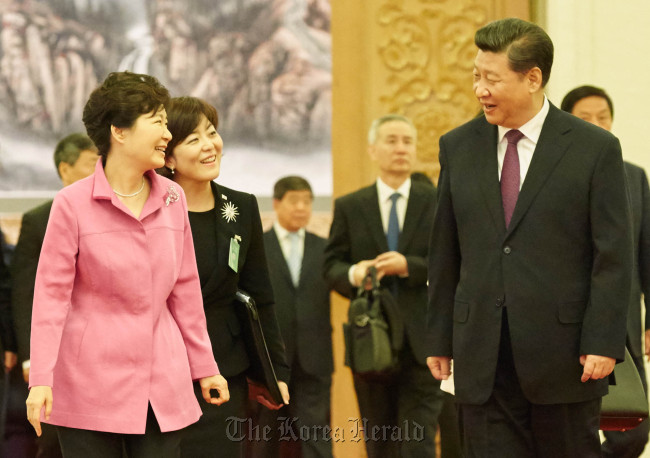The summit Wednesday between Presidents Park Geun-hye and Xi Jinping demonstrated the two countries’ evolving, increasingly multifaceted ties while building momentum for Seoul’s efforts to play a more proactive role in peninsula issues and regional diplomacy.
During the meeting, Xi touted the bilateral relationship has developed to its “best-ever” in terms of politics, economy, trade, people-to-people exchanges and other areas, thanks to the two leaders’ cooperation.
Park, for her part, expressed gratitude for taking a “constructive” role in tackling a recent flare-up in tensions with North Korea, stressing the significance of the two nations’ “strategic collaboration” and a unification of the peninsula in ensuring peace in the region.
During the meeting, Xi touted the bilateral relationship has developed to its “best-ever” in terms of politics, economy, trade, people-to-people exchanges and other areas, thanks to the two leaders’ cooperation.
Park, for her part, expressed gratitude for taking a “constructive” role in tackling a recent flare-up in tensions with North Korea, stressing the significance of the two nations’ “strategic collaboration” and a unification of the peninsula in ensuring peace in the region.

For South Korea, the rising global power is one of its biggest trade, tourism and investment partners and the most pivotal leverage holder in deterring Pyongyang’s nuclear advancement. For China, a closer relationship with Seoul is indispensable in stabilizing Northeast Asia, keeping the U.S. and Japan in check and nailing down its ambitious regional projects.
With the alliance with the U.S. being the backbone of South Korea’s security, however, its ties with China have long focused on economic cooperation.
Seoul has been in recent years compelled to walk a fine line between the two world powers as their rivalries escalate over trade, currency and strategic supremacy in the Asia Pacific. Former administrations have tended to oscillate between them depending on their ideologies.
Since her swearing-in in early 2013, Park has been taking a different approach -- to sustain the “best” bilateral relations both with the U.S. and China. While keeping up the U.S. ties, she has sought to transform the relationship with China into a more diverse one that entails greater strategic cooperation.
With Xi, she herself tried, and apparently succeeded in, building personal rapport. During their summit last year, the two presidents agreed to install a military hotline, closing long dragged-out discussions that were initiated seven years ago. Park is slated to attend a massive military parade in Beijing on Thursday, to which the South Korean military also unprecedentedly sent a three-member delegation led by a three-star general at the Joint Chiefs of Staff.
“Given the recent increased tensions on the Korean peninsula, it is of some surprise to see South Korean President Park planning to attend, but not (North Korean leader Kim Jong-un),” Lauren Dickey, a researcher at the Council on Foreign Relations in Washington, said in a recent commentary piece.
“This comes into even starker relief when juxtaposed with the powerful U.S.-South Korean military alliance that keeps 28,500 US troops stationed on the peninsula.”
Yet the new strategy has also brought dilemmas and setbacks, demanding Seoul make a tricky choice between them in delicate issues such as joining a China-led development bank and the possible stationing of advanced U.S. missile defense assets here.
Foreign Minister Yun Byung-se even came under fire early this year for arguing that to get “love calls” from both of the powers constitutes a “blessing,” not a dilemma.
The sensitivity was also laid bare in the lead-up to her trip. Though it has already decided to take part in the military parade, Cheong Wa Dae postponed its announcement almost to the last minute, apparently wary of potential backlash from not only Washington, but others at home and abroad cautious about security cooperation with Beijing. Though the U.S. expressed its respect of the decision in a formal setting, many officials from there did not attempt to hide their uncomfortable feelings behind the curtains.
For the approach to turn into a “blessing” in the face of South Korea’s geopolitical situation, Seoul should set up clear goals and define its interests -- the “core” of its dual diplomacy -- as well as long-term principles and strategies that could endure changes of the administration, said Kim Han-kwon, a professor at the Korea National Diplomatic Academy.
”Aside from the single-term presidency and ideological polarization in society, the government’s foreign policy priorities have often been subject to debate due to a lack of bipartisan, nationwide consensus-building process about diplomatic principles and strategies,” he said in a recent analysis.
“South Korea should make clear its position built on its national goals and interests before the U.S. and China respectively heap pressure for their own interests, so that the pressure will not be about choice but negotiations aimed at finding a nexus between the sides’ interests.”
By Shin Hyon-hee (heeshin@heraldcorp.com)











![[Hello India] Hyundai Motor vows to boost 'clean mobility' in India](http://res.heraldm.com/phpwas/restmb_idxmake.php?idx=644&simg=/content/image/2024/04/25/20240425050672_0.jpg&u=)







